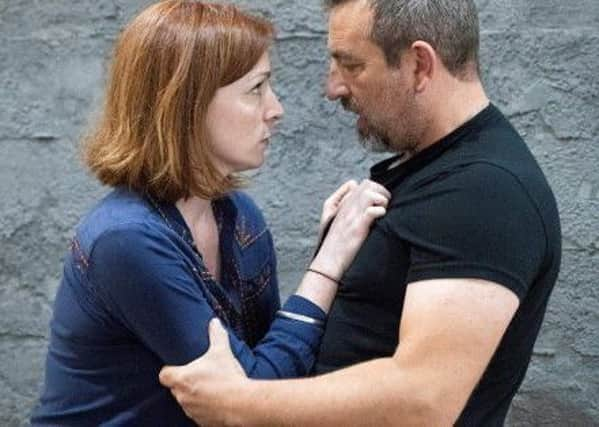Theatre interview: Michael Nardone on starring in a new production of Macbeth, set in a modern world facing social collapse


Yet the production survived, attracted large audiences, and embarked last month on a nationwide tour, which has so far taken it from the Lowry in Manchester to the Theatre Royal, Plymouth, before it arrives at the Festival Theatre, Edinburgh next week; and nothing about the show’s history seems likely to curb the enthusiasm of the man who has stepped into the role of Macbeth, playing opposite Kirsty Besterman’s Lady Macbeth throughout the tour.
The Scottish actor Michael Nardone was born in 1967 in Fife, into a family that included both coal miners and far-travelled Italian migrants who had made their homes in Scotland. He studied theatre at Queen Margaret University in Edinburgh, before building a successful career in Scottish theatre and television, and appeared in many of the great new Scottish plays of the 1990s and 2000s, including the world premiers of David Harrower’s Knives In Hens, and Gregory Burke’s Gagarin Way.
Advertisement
Hide AdAfter he moved his family south to live closer to London in the early 2000s, he continued to work successfully on stage and in film and television, appearing in the BBC/HBO series Rome, the Canadian made series Durham County, as well as continuing his theatre career with roles including the Duke of Cornwall in Sam Mendes’s 2014 National Theatre production of King Lear, starring Simon Russell Beale. “That was an education, being in a rehearsal room with those two,” says Nardone, with a smile. And now, at 51, he feels more than ready to take on one of the greatest challenges in the whole theatrical canon.
“I think what excites me most about this production is the fact that it’s set right now,” says Nardone. “It imagines the collapse of a society in a way that often seems very close to us now, in war zones or in areas where there have been huge natural disasters. When the production opened – and I saw it in London before I knew I would ever appear in it – there was a lot of talk of its “post-apocalyptic” landscape. The truth is, though, that you don’t need a global apocalypse to plunge societies into that kind of chaos – look at Syria, or what happened in former Yugoslavia. Systems break down, law and order breaks down – and then, like Scotland in the 10th century, it becomes a violent power struggle between competing war-lords; a series of blood feuds, if you like.”
Although Nardone has rarely appeared in Shakespeare plays during his career, he feels that the range of soldiers and men of violence he has played on both stage and screen, has helped prepare him for the role of Macbeth; and he also feels absolutely undaunted by the play’s famously lurid and brilliant language.
“This is quite a sharply cut version of Macbeth,” says Nardone, “and because of the way it’s cut, Macbeth is on stage almost all the time. So it’s a huge part to learn.
“Yet at one point earlier this year, when I was working very hard and quite anxiously on the text, I had a kind of epiphany with it. I was in my London digs, working on the lines, and something suddenly clicked and I thought, ‘This is just utterly brilliant. This is superb writing for the theatre, and it’s a gift to be able to say it.’ It was like the moment when you score a penalty, a sense of absolute exhilaration, of embracing the challenge rather than being wary of it. And from that moment, I just became much more relaxed; and the whole experience became completely pleasurable, in a way that’s hard to explain.”
The reason Nardone was living in digs during London rehearsals for Macbeth is that earlier this year, he and his wife Natalie finally returned to Scotland and are now living in Edinburgh; Nardone says that after the EU referendum of 2016, he and Natalie felt a change of mood in the Home Counties where they were living, and realised that with three of their four children grown up and away from home, this was the time to make the move back they had long promised themselves.
Advertisement
Hide Ad“For a while, it was very important for my career to be close to London,” says Nardone, “and I never regretted moving down there. But everything has changed so much for actors, with the coming of the internet and the mobile phone, that it hardly seems to matter anymore where you live. Some people hate this new age of Skype interviews and self-tapes and actors effectively auditioning online, but for me it’s been an absolute liberation.
“As for doing more work in theatre here – well, we’ll see. I certainly have boundless admiration for my contemporaries who have
Advertisement
Hide Adcommitted themselves to making a career here. What I do know, though, is that I absolutely can’t wait to bring this Macbeth to Edinburgh and Glasgow. It’s brief, it’s powerful, it reminds us how close we are to a world ruled by the kind of violence that shapes Macbeth’s life; and I think Scottish audiences will absolutely love it.” - Joyce McMillan
Macbeth at the Festival Theatre, Edinburgh, 23-27 October, and at the Theatre Royal, Glasgow, 19-23 February